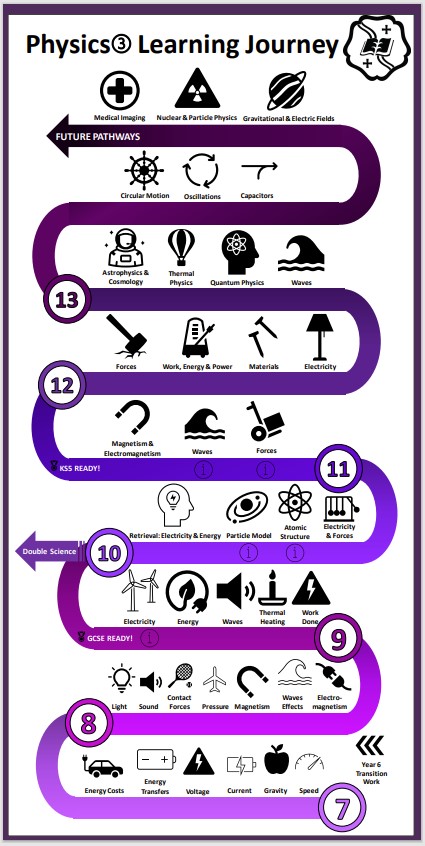To educate,
inspire and promote the understanding of the role Sciences play in human
endeavour. Students will be able to make rational life choices, develop skills
relevant to future careers and contribute meaningfully to a modern society.
The specification is divided into topics each covering different key concepts. As learners progress through the course they will build on their knowledge of the laws of Physics, applying their understanding to solve problems on topics ranging from Sub-Atomic Particles to the Entire Universe. The specification aims to encourage learners to develop essential knowledge and understanding of different areas of the subject, and how they relate to each other, as well as a deep appreciation of the skills, knowledge and understanding of scientific methods. Learners will also develop competence and confidence in a variety of practical, mathematical and problem solving skills. There are opportunities throughout the course for learners to hone their interest in and enthusiasm for the subject, to understand how society makes decisions related to scientific issues, and also how the sciences contribute to the success of the economy and society as a whole.
Educate students to acquire a firm understanding of key scientific principles and detailed technical knowledge, opening pathways to Science and technology vocations.
Students will be able to relate technical knowledge to developments in society (eg climate change/sustainable development) Further develop logical thinking and problem-solving skills and scientific literacy. Facilitate extend practical and organisational skills.
Topic areas taught at KS4 will be revisited in each subject’s A Level course in more breadth and depth. As Science is a spiral curriculum this will building upon previous knowledge, content and skills to enhance a greater comprehension and appreciation of Science.
STEM activities at KS5 include; trips to Higher Education providers (eg biomedical imaging, high voltage lab); opportunities to study subjects in ‘the field’ (eg Biology Field Trips, Chemistry work in Southampton University laboratories); Talks by visitors (eg genetic engineering as part of Science week); aspiring medics and vets programme.
Exam Board: OCR
Qualification Title: Physics
Qualification Specification Code: H556
Qualification Webpage: Click here to visit the OCR webpage for the specification.
Standard Sixth Form entry requirements, plus a grade 6 in GCSE Science

Physics Research
and Development, Engineering of many disciplines from Communications, Chemical,
Electrical, Automotive and Marine, to name but a few. The following fields
allow Physicists to use their mathematical and analytical skills: Business, HR,
Finance, IT, Consultancy, Banking and Accountancy. The analytical skills and
logical approach developed in the study of Physics is well regarded in many
fields. Learners will also develop the transferable skills that are in demand
by Further Education, Higher Education and employers in all sectors of
industry. This course will allow them to develop as a confident, independent
thinker and, also as someone who can operate effectively as an individual or
part of a team – all skills that will enable them to stand out and promote
themselves as they progress through life.
Mrs L. Green

Owned by: LSN | Last Published: 05/10/2019 15:10:22 | Next Update: N/A